Voices of Resistance: Reflecting on Celebrating Dissent Oslo 2024
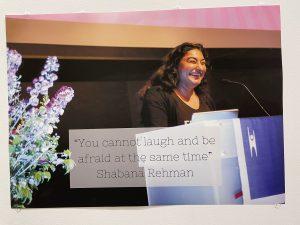
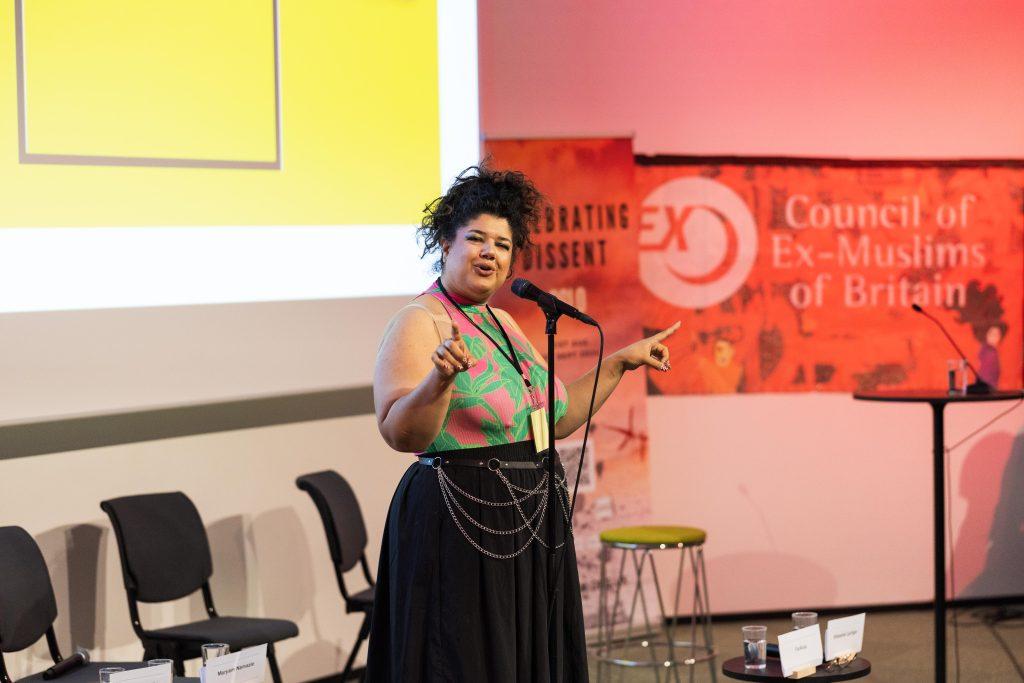
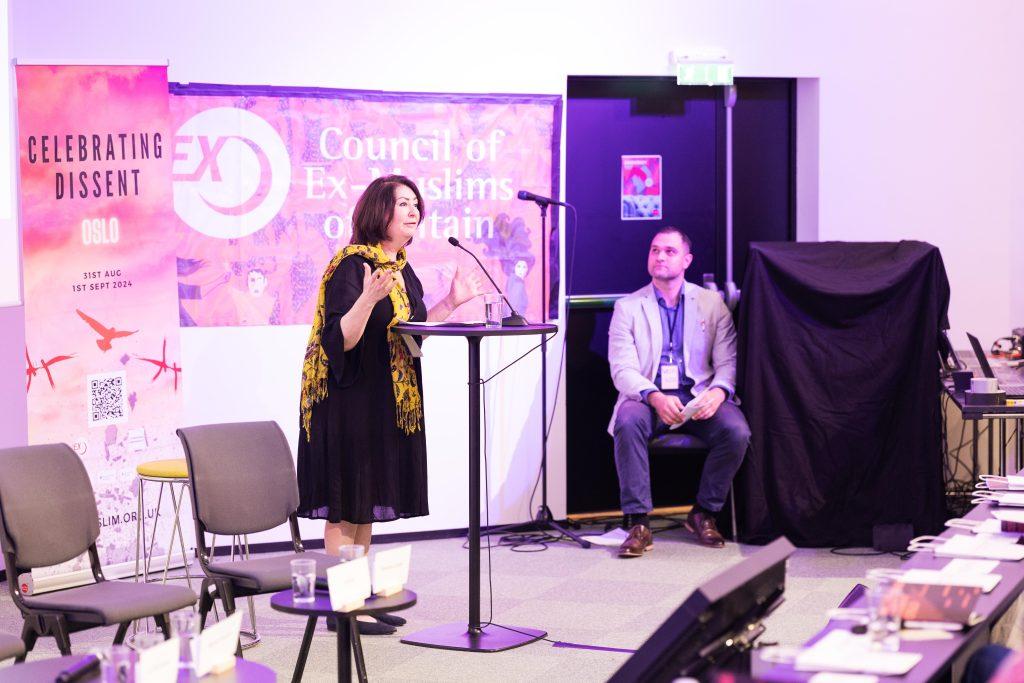
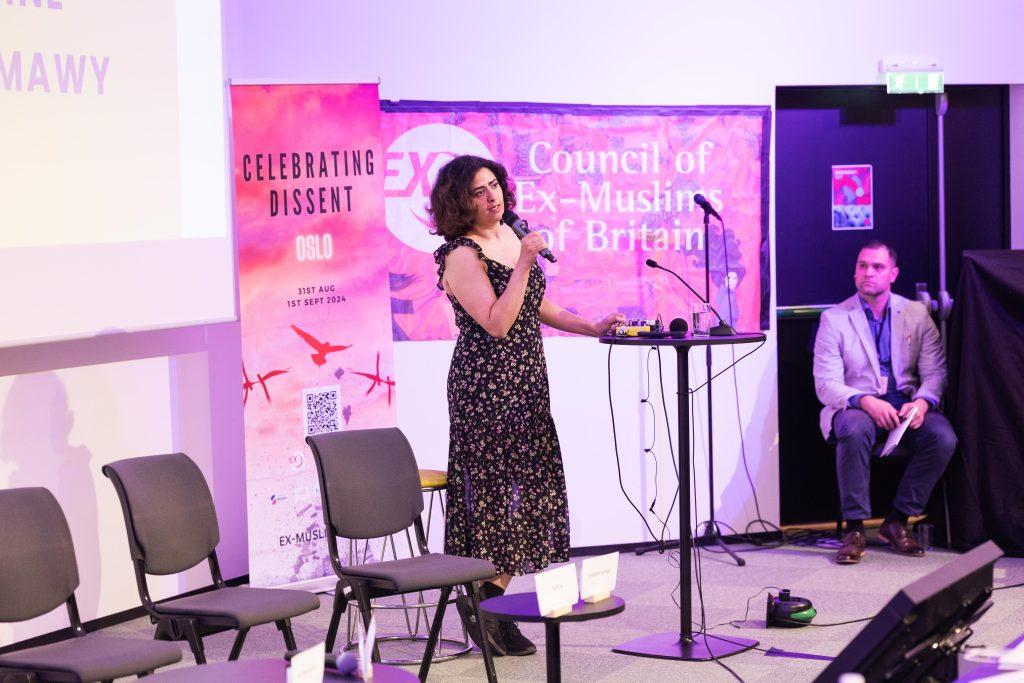
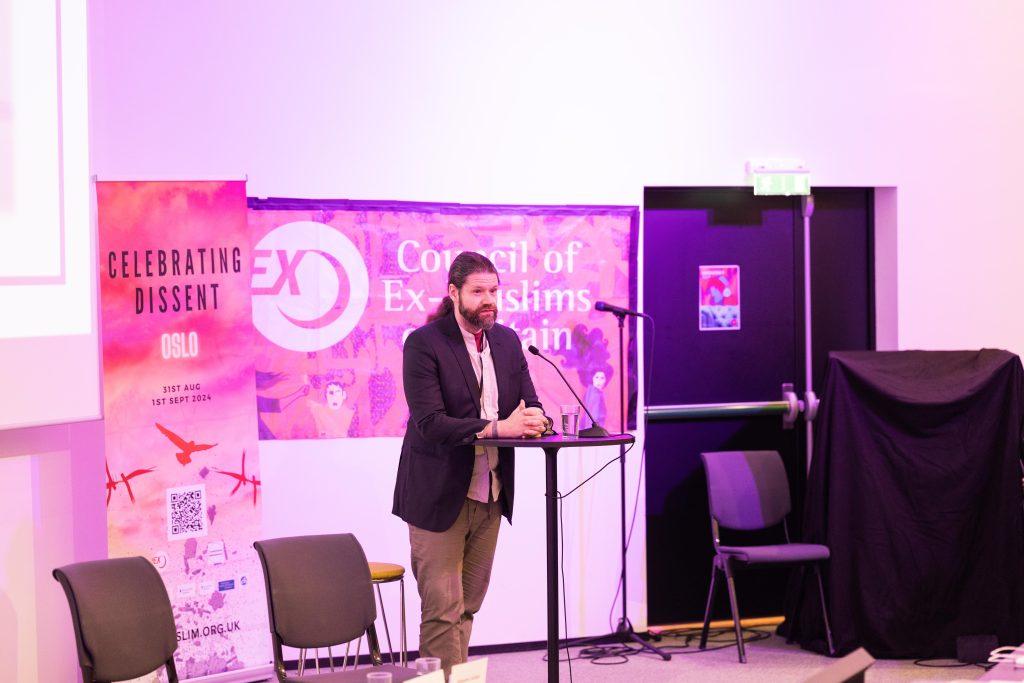
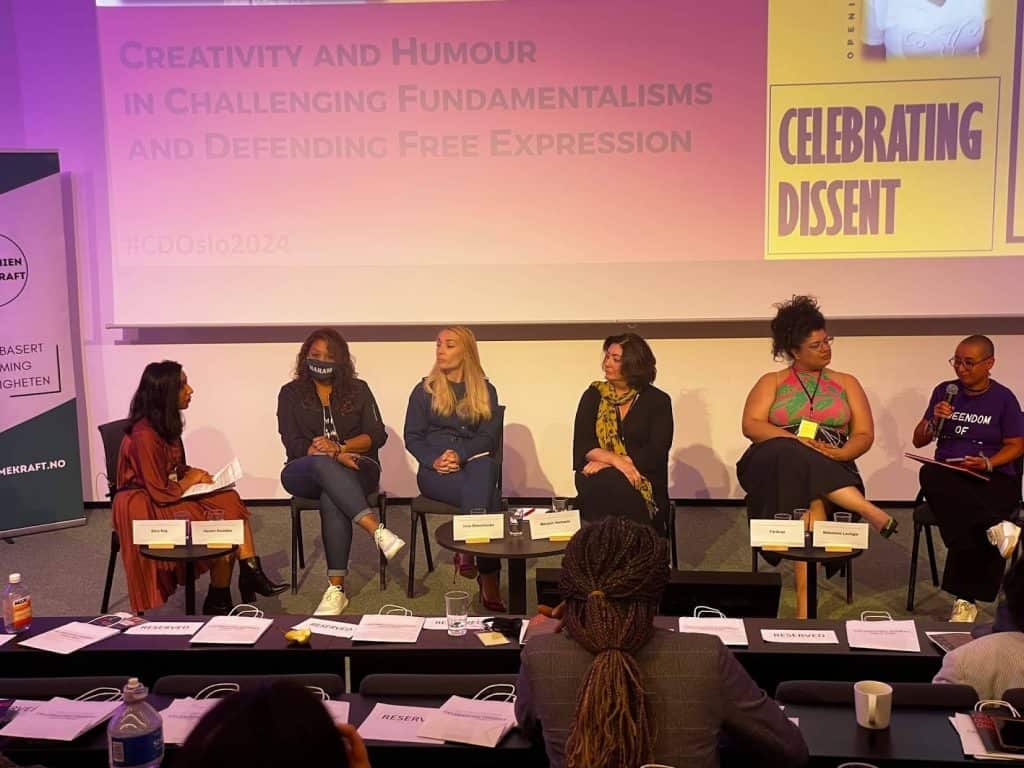
Written by Vieled Rose
Before attending Celebrating Dissent Oslo 2024, I was filled with anxiety. My only interactions with other ExMuslims had been online, and the thought of joining the largest global gathering of dissenters was overwhelming. Now, I’m grateful I didn’t let fear hold me back.
The conference was a transformative experience. We honoured those who couldn’t be with us—imprisoned, tortured, or killed for questioning religious dogma. Surrounded by courageous voices from across the world, I found healing, solidarity, and renewed strength to continue fighting for our freedom.
What struck me most alongside the truly internationalist audience was the wide age range and the huge cross section of approaches and strategies to dissent at the conference, including people from different political stances. Despite being from diverse disconnected parts of the globe, the international gathering was clear evidence of one commonality; Islamist religious dogma and intolerance universally affect us all whatever corner of the globe we hail from, it is not a matter of coincidence or a few bad apples here and there, it is consistently damaging and denying the rights of humans to be authentic. Any criticism or objection to its human rights abuses is seen as dissent and faces fierce repercussions.
I was introduced to many speakers and attendees for the first time—people who have dedicated their lives to fighting for human rights and the freedom to dissent. One such figure was ExMuslim author Ibn Warraq, known for his books criticizing Islam, deconstructing the Quran, and explaining why he left the faith over the past few decades. Another was Sanal Edamaruku, founder-president of Rationalist International, who had to flee India for debunking the fraudulent claims of religious gurus on national TV. These gurus claimed they could curse and harm him without physical contact, even threatening his life. Despite surviving a machete attack and being forced to leave his homeland, Sanal continues to stand tall, advocating for rationality and human rights, undeterred by the dangers he faces.
There were many moments where I was starstruck, meeting such brave and courageous ExMuslims—ordinary people who had endured religious trauma and abuse and refused to be silenced, hidden, or cowered. None of them saw themselves as stars; they were simply human beings, supporting one another. All they wanted was to live free from persecution, threats, and violence. Like all of us, they just wanted to be their authentic selves, free to agree or disagree, to take up space and express themselves—whether through art, music, writing, spoken word, or videography.
Time and time again, I saw the incredible humor and warmth of those attending. Whenever I mentioned it, people would say something similar: “Here, I can finally be myself. This is where I belong. It feels like family.”
For many of us, including myself, it was the first time attending such an event. While there was plenty of art, music, and laughter, there were also tears of relief, sorrow, and joy. Many at the conference had been attending Celebrating Dissent since it began seventeen years ago. Among them were individuals who had been exiled from their homelands, forced to flee for their lives. Many had organised and fought alongside each other to reach safety. The deep bonds formed through their struggles were evident, and it was clear just how much this conference and its people mean to one another.
The conference had a huge impact on my healing from religious trauma. I discovered I belong to a chosen family of activists who spoke my language of humanity, compassion and determination to unveil harmful irrational dogmas. Presently the influence and resources of religious institutions far outweigh that of ExMuslims and dissenters. Thus, this conference was an intense weekend where we were able to build, reinforce and showcase the work done by Ex Muslim organisations and activists over the years.
Tribute to Shabana Rehman:
Although I never had the chance to meet Shabana Rehman, there was so much I learned about her at the conference that deeply resonated with me and has been incredibly helpful in my healing journey. A couple of key ideas I want to share come from her words, as we commemorated her life with both laughter and heartfelt reflections.
Shabana Rehman was a Norwegian comedian, writer, and human rights activist of Pakistani descent. She was known for her bold critiques of religious and cultural norms, especially concerning Islam. Shabana gained international attention for her fearless humour, which she used to challenge dogmatic beliefs and promote freedom of expression, women’s rights, and secularism.
In Shabana’s video Why I Showed My Butt, she gave a powerful message to us. It is not our dissent, it is not our actions that are unhinged and outrageous, it is their reaction to us that is outrageous. It is not her butt on show which is outrageous, but their reaction of driving by her family business premises and shooting bullets into the premises that was outrageous.
I believe Islamists have effectively constructed a narrative in which ExMuslims, apostates, and secularists are portrayed as troublemakers and provocateurs, accused of provoking Islamist reactions to such an extent that the Islamists themselves are absolved of responsibility for their actions. This narrative has enabled them to shift the blame onto ExMuslims and secularists who dare to expose their human rights abuses.
But as Shabana Rehman aptly put it, we are not initiating anything, we are not provoking anything. It is their actions of silencing us, to silence our very being and divide us and torture us for not complying that is the provoking triggering actions to our dissent and blasphemy; It is their actions of torturing, imprisoning and sentencing to death members of our LGBT community, women who ‘dare’ to sing, show strands of hair, travel alone, people who cannot bring themselves to lie about their rational nature about their apostacy from Islam, people who cannot stand by while human rights are abused. It is their actions that are outrageous that are triggering and provoking our dissent.
Sorry, that got heavy and scary, there is a lot of anger and fear amongst us dissenters; but there is also determination to live fully, as we see this as the only life we have, and we do all we can to make the most of it. Our activism doesn’t have to be dictated to us by those who want to silence us. If anything, humour is a must in our activism in our journey of dissent, as Shabana Rehman put it ‘it is important to laugh, when we are laughing, we cannot be in fear’.
As women our voices, our bodies, our sexuality is all blasphemy, how dare we express them, how dare we exist, this is the pathologically harmful deeply held belief of the likes of the Taliban who have recently made it illegal for a woman to use her voice in public. This is the controlling abusive mindset that many at the conference had fled from their motherlands in Islamic nations, whilst others of us are resisting in our communities in secular nations.
“Activism in art has to be subversive otherwise it is just entertainment.” Betty Lachgar
“Islam sucks the fun out of a room” Haram Doodles:
There was so much talent it was truly humbling and emboldening. Islam has many dictates that literally sucks the fun out of living and deadens the human spirit. It was delightful to see the conference panel on Blasphemous Women, perhaps another apt title would be subversive women who reject the labels of fitna and awrah. For zealots women in themselves are blasphemy are subversive. The religiously sanctified act of stoning women is an ultimate act of repressing and stamping out blasphemy and hatred of women.
FarAvaz and the Right to Sing
FarAvaz is an Iranian singer and feminist activist who was arrested for the “blasphemous” act of singing solo in public. If she returns to Iran, she faces a year in prison. For years, she was silenced and forced to hide her true self. In 2018, FarAvaz launched the ‘Right to Sing’ campaign online, opposing the ban on women singing publicly in Iran. Her efforts have continued to inspire resistance, with Afghan women now participating in an online campaign defying the Taliban’s criminalization of women’s voices.
Faravaz has also set up an organisation ‘Right to Sing’ to raise awareness of the ban on women expressing themselves through singing. Her music of hope, resilience and activism gives many women hope and emboldens them to be true to themselves. Social media has enabled her to reach people, where traditional media outlets had refused to give her a platform. Now she has a platform many music companies have approached her for deals, which she has refused. Instead Faravaz is insisting on her music being a vehicle for expressing herself especially her rage against those who wish to silence her and women’s voices. Her performances at conference were truly stunning oozing musical talent, love and compassion for humanity.
There were also countless heartbreaking and tearful moments as we listened to the experiences of dissenters, filled with shock and horror at their stories.
Mina Ahadi, founder of the International Campaign Against Stoning, delivered one of the most powerful speeches at the conference. She recounted witnessing a woman being stoned to death and how she believed the world would be horrified and take action to stop such atrocities. Yet, when she spoke to a large audience of women on International Women’s Day, she was told it was a “cultural issue” that didn’t need addressing. This dismissal was both shocking and dehumanising—a struggle many ExMuslims face when campaigning against blasphemy, homophobic laws, and gender apartheid. Despite these challenges, Mina continues to fight. Her activism has helped shut down 54 Islamic centres in Germany linked to the Iranian regime.
Mina also led an international campaign to stop the stoning of Sakineh Mohammadi Ashtiani. After organising the first protest against compulsory hijab in Iran, her husband and five others were executed by Iranian secret police, and Mina was sentenced to death. She fled to Germany, where she founded Zentralrats der ExMuslime and the International Committee Against Stoning in 2001, all while enduring ongoing threats to her life.
Yasmine El Baramawy gave a deeply emotional speech before performing at the conference, expressing her relief at finally speaking to an audience that supported her fight for women’s rights. For the first time, she was surrounded by those who understood her struggle for freedom from abuse and the backlash that comes with speaking out.
Yasmine was part of the 2011 Egyptian protests that toppled Hosni Mubarak. However, like many Arab Spring movements, the regime retaliated by using sexual violence against women protesters. She herself was brutally assaulted by a mob in Tahrir Square but refused to remain silent, seeking justice publicly on national TV. Her efforts helped lead to the criminalization of sexual harassment in Egypt, a major victory in a conservative society where women are often silenced.
Now living in Sweden, Yasmine continues to advocate for women’s rights and works as a musician and singer, using her platform to speak out against sexual violence and empower women.
Canaries in the coalmine
There were so many many many more amazing individuals with similar stories of fighting for human rights for women’s rights for the right to dissent and speak truth to power and abuses of power where people have had to flee their homelands to stay alive. Even in western secular democracies, many of us have had to deal with backlash from those who wish to silence us.
During the plenary session, coal mines in the canary, Khadija Khan a journalist and broadcaster spoke about how she had been attacked by two female Muslim co-workers in retaliation to her apostasy in the UK. Jimmy Bangash, a psychotherapist who works to support Ex Muslims, spoke how he was classed as a hateful Islamophobe for discussing the issues of religious trauma amongst Ex Muslims during his training programme. He was told he would have to leave the course as a result, following weeks of appealing the decision he was able to continue, sadly those who had an objection to Jimmy Bangash’s insights into the trauma caused by religious abuse amongst Ex Muslim refused to continue the course.
The silencing doesn’t stop there. Arguably many of us at the conference spoke about how we felt ignored and dismissed by western feminists seeing our struggle as unimportant as separate internal issues within our cultures. But there are some western feminists who are outside of the Ex Muslim-community who work with us as allies. They too face backlash from the work they do to support Ex Muslims. Victoria Gugenheim spoke of her pride in doing the artwork and branding for the Council of Ex Muslims of Britain, of her pride in the protest body art she has done in response to the Women Life Freedom movement for the Iranian Revolution 2022. She spoke of how she had numerous death threats and abuse in response to the work she does with CEMB.
The founder of Femen Jenny Wenhammer spoke of how she could not walk away from raising her voice in protest of how women are treated by Islamic regimes, she spoke of how she very much sees the conference as part of a big family to support one another in our struggles. She spoke of the imaginative ways she has protested gender apartheid and discrimination similarly the subversive creative actions of Ex Muslim and Human rights activist Ibtissame Betty Lachgar. Both of whom may come from different parts of the world with different cultural and religious backgrounds but their imagination and determination to fight patriarchal systems that deem women’s very existence and being as blasphemy.
Betty Lachgar has won awards for creative activism. Her activism includes actions such as kissing in public. Yes, kissing between consenting adults in public is considered public indecency and often punishable by lashing, imprisonment or in some extreme cases stoning. Yes, such a daring act in Morocco, which saw her and her fellow activists being attacked by Islamist. This was in response to the backlash faced by a young couple sharing a social media post of them kissing. Such public displays of affection are taken for granted now in the secular nations following the struggles of dissenters who opposed the dark days of rule by religious zealots in the west.
Tribute to those unable to attend, Rest In Power:
Sadly, many were not able to be with us, as we walked into the conference hall there were memorial notices for all those who had been imprisoned, tortured, murdered for blasphemy. The ‘crime’ of questioning religious abuse, for exposing the trauma caused by religious dogma, or for simply being on social media as women ‘daring’ to show their faces, many just dared comment on religion on social media posts. People from across the world who have been silenced and no longer with us were remembered as we walked into the conference. We must never forget the torment they went through and continue with determination to organise and fight for the right to be human, free of fear for being our authentic selves, free to criticise and expose human rights abuses.
Today ExMuslim are the canaries in the front line fighting for freedom, fighting for secularism, but if we fail desist in raising our voice it further emboldens zealots like the Taliban but also the Christian zealot’s agenda such as banning abortions and women’s rights and in general taking us all back to the dark ages of religious rule.
The conference was a magnificent show of solidarity of unity between all those present in the struggle for freedom to dissent, to be freethinkers, to be free from religion to critique, to be rational and above all else to be authentic in our humanity without silencing and fear from religious abuse and trauma.
Such a conference would not have been possible without the solidarity and support of the Norwegian Humanist Society, which handled the logistics. Morten Guldberg, leader of the Norwegian Humanist Society, emphasised the importance of standing together, pooling our resources to fight against tyranny. Senior Advisor Arnfinn Pettersen also played a key role in making this gathering possible, reinforcing the commitment of the Norwegian Humanist Association to support the global movement for freedom and human rights. Together, their efforts allowed this vital event to take place.